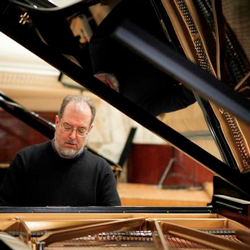by Mike Telin
Note: this performance was eventually cancelled due to illness.
Performance
On Tuesday, February 12 at 8:00 pm in Finney Chapel, Garrick Ohlsson will make his debut on the Oberlin Artist Recital Series. Ohlsson’s program includes Brahms’s Rhapsodies, op. 79, Liszt’s Fantasia on Ad Nos, Ad salutarem undam, S. 259, Scriabin’s Two Pieces, op. 57, Étrangeté, op. 63, no. 2 & Vers la Flamme, op. 72 and Chopin’s Fantasy, op. 49 and Scherzo, op. 31 (all original tickets will be honored).
On Monday, February 11th beginning at 5:00 pm in the Oberlin Conservatory Annex, Garrick Ohlsson will take part in a question and answer session moderated by Oberlin piano professor Peter Takács.
The following are excerpts of an interview with Garrick Ohlsson that was originally published on October 30, 2012.
Mike Telin: We’re looking forward to your Oberlin performance.
Garrick Ohlsson: I’m looking forward to it as well. I did play in Oberlin once as a run-out with The Cleveland Orchestra. It was one of those go out, try the piano, play the concert and go back to Cleveland. So this will be a more profound experience because I will get to practice in the Chapel. So that’s exciting.
MT: The Liszt is an interesting piece. He wrote it for organ.
GO: The truly weird piece is the Liszt. The problem with organ repertory is that in the organ world they all know this stuff, but the rest of us don’t. When Liszt and Busoni transcribed the music of Bach, they were on a mission to broaden the knowledge of these great pieces. I didn’t know the Fantasia on Ad Nos until about ten years ago. Somebody suggested that I listen to it and I was just staggered because here was Liszt’s other sonata in b minor, only it was written for the organ. It’s a single movement based on one theme, with the transformation in a sort of hell-to-heaven and love-and-death emotional climate. I’m not saying that with any sarcasm at all. It’s high romanticism and a masterpiece of serious writing.
I do think the b minor sonata is probably his greatest work, if there is such a thing. It contains no vulgarity and no false steps, which he is prone to sometimes. This piece is similar in its utter seriousness in purpose and construction. But it’s hyper-romantic with a religious overtone. So it sounds very churchly and that’s not bad either. Liszt himself was very much a part of the nineteenth century religiousness in the deepest sense. I think it’s a splendid work, and once again, even though people are not so familiar with it in the piano context.
MT: On a completely different topic, I listened to the question and answer session you gave at Cal Performances and you have a wonderful way of talking about music; you make everything so easy to understand.
GO: I try. For me, music is such a visceral experience that when discussions get too intellectual or technical even I turn off, although I can have that intellectual discussion because that is a part of music.
In any great work there is that other, more numinous level of experience, and it’s fun when you can point out how a composer achieves something. I used the example of Chopin’s ah! moment. I’m just trying to show people that there is a real scientist at work. But, I still don’t know what his inspiration was. I’m not a composer but it seems to me that inspiration has to precede all the technicality.
When I listen to music I listen in great detail when necessary but mostly I listen to that great thing called the flow. And if a performance is good enough, I tend not to be too concerned about things like, oh he made the crescendo a little too early or this wasn’t quite together. I can diagnose it if necessary but that’s not the way I like to listen to music. I don’t like to listen to music as if I’m the police watching for infractions.
MT: That’s a great way of putting it because we do tend to get caught up in that style of listening.
GO: Absolutely. But you as a critic and I as a musician, if we can’t do that we shouldn’t be doing what we do. Sometimes we do miss the forest for the trees, but on the other hand, professionals have to be able to be very analytical.
When I am playing I like to know the work so well that I can get beyond worrying about what the notes are, and whether or not I can play a certain passage. Some passages you never can play very well. (Laughing) There is a great story about Martha Argerich whom I know hardly at all, but somebody said, “Martha, you know this piece so well, why keep practicing?” And she said “it’s not a question of that, I want to be able to enjoy it when I play it.” In other words, you have to get yourself to such a level that you can abandon yourself to the music rather then worrying about [the notes].
Published on ClevelandClassical.com February 5, 2013
Click here for a printable version of this article.



